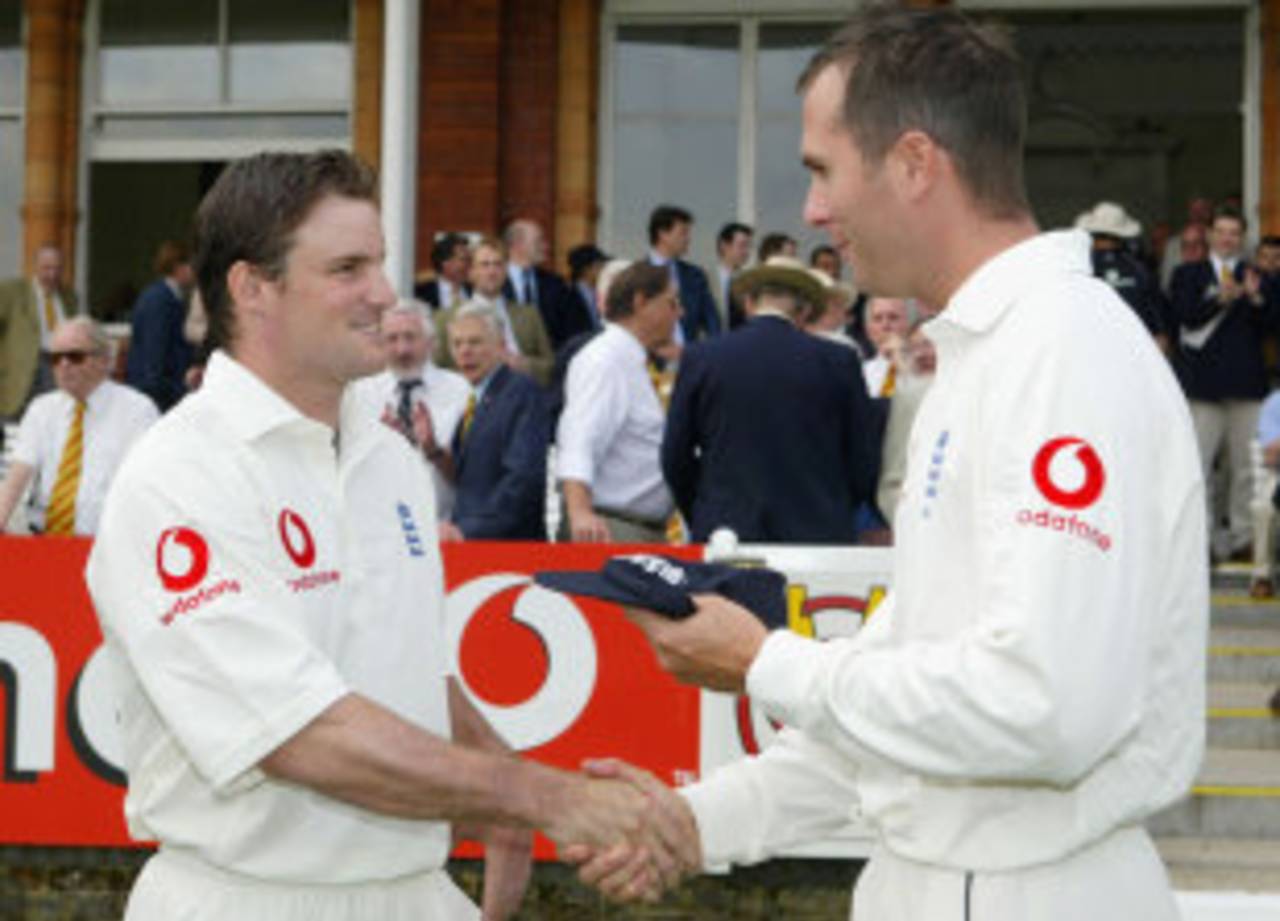'You learn more in defeat than in victory'
On the occasion of his 100th Test, Andrew Strauss looks back on his journey, and at the tough times when even playing international cricket seemed inconceivable

Strauss gets his Test cap from Michael Vaughan at Lord's, 2004 • Getty Images
Taking the step up
The year before, I was really questioning whether I was going to make it. I'd started at Middlesex in 1997 and was immediately given a rude awakening. I soon realised I was miles away from the standard required to be a professional cricketer. In 1998 I worked much harder and things started to go a bit better. I had become more professional and woken up to what being professional meant. I made my first-class debut at the end of the 1998 season and I scored a few runs. So, by 1999, I was very confident I could make a career out of cricket, but I had no idea how far I could go in the game. I was just trying to establish myself in the Middlesex first team. I was still on the periphery at that stage, but I was highly motivated and I had learned my lessons from a time as a student joker when I was just playing at the idea of being a professional cricketer.
Promotion and a role model
Justin Langer was very important early in my career. He was a great example. He was playing for Australia at the time, but he was at Middlesex, scoring runs every week. And he was training hard. He was doing things that the majority of players weren't doing. That was the key thing I took from him: I realised that if I wanted to play for England, I couldn't just do what everyone else was doing. I wasn't going to get better than them that way. I had to do more. I had to dig deeper, work harder and challenge myself more.

England humbled 5-0 in the Ashes and then eliminated early from the World Cup
That was a horrendous winter. We went to Australia full of enthusiasm and anticipation of what we thought would be a great series. We fell flat on our faces in Australia against a fantastic side. And then we never got going in the World Cup. It was devastating collectively and individually. I didn't play well and I was dropped from the ODI team for the first time during the World Cup. The whole experience really knocked the wind out of my sails.
A career-saving century in Napier
I was in the last-chance saloon, wasn't I? I had been dropped from the side for the Sri Lanka tour, and, having been brought back, I hadn't scored many runs. I was fortunate, really: I came in to bat for the final innings of the final Test against New Zealand. The wicket was flat and I was able to concentrate hard. I scored a century. It concentrates the mind when you know your place is in jeopardy. There was no way that I was going to be caught at extra cover in that innings. There was nothing carefree or relaxed about that innings. I just battled.
England retain the Ashes in Australia
One of my great ambitions was always to go to Australia and win. So to achieve that, and to achieve that in such an emphatic fashion, was very special. I honestly felt very proud and fortunate to be part of such an outstanding group of cricketers. On the back of that Ashes victory, I felt we had the opportunity to go and create something special. We're a little way down the line now and there is a lot still to do, but I feel we're still progressing.

The next 12 or 18 months are probably a defining period for us. We've done exceptionally well to get to No. 1 and the next period will determine how good we really are. I'm excited about it. It's just the sort of challenge - or the series of challenges - we need as a group. Our versatility will be tested. We are going to be tested in different conditions by the best cricketers in the world. And that's exactly what you want as an international cricketer. You want to be tested by the best in conditions that stretch you. I have faith in the group of players we have that we can come through all those tests and emerge on top.
George Dobell is a senior correspondent at ESPNcricinfo
Investec, the specialist bank and asset manager, is the title sponsor of Test Match cricket in England. Visit the Investec Cricket Zone for player analysis, stats, Test match info and games